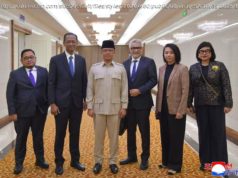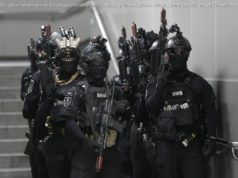Korea is none of the U. S. government’s business. The only proper course of action is for the Pentagon and the CIA to exit the country and bring those 23,000 American soldiers stationed in Korea home
K orea is none of the U. S. government’s business. The only proper course of action is for the Pentagon and the CIA to exit the country and bring those 23,000 American soldiers stationed in Korea home. No negotiations. No agreements. No talks. Just butt out of what is none of your business and exit the scene by coming home.
Why are there 23,000 U. S. troops in Korea? It’s because the U. S. government, headed by President Harry S. Truman and his newly established national-security establishment, decided to intervene in another country’s civil war more than half-a-century ago.
That’s right — a civil war. That’s all it was.
What business did the U. S. government have in intervening in another country’s civil war? No business at all. The Korean civil war, just like the civil war in Vietnam, was none of the U. S. government’s business.
Supporters of the Korean intervention say that North Korea invaded South Korea. Even if that was true, so what? The North invaded the South during America’s civil war. Did the fact that President Lincoln sent his army into Virginia make America’s civil war the business of Korea, China, Russia, or any other foreign country? It did not. America’s civil war was none of Korea’s business, just as the Korean civil war was none of the U. S. government’s business and still is none of the U. S. government’s business.
President Truman, the Pentagon, and the CIA maintained that they had the legitimate authority to butt into Korea’s civil war because, they said, the communists were coming to get us as part of a worldwide communist conspiracy that was supposedly based in Moscow, Russia. (Yes, that Russia!) If the United States didn’ t send forces to fight the Reds in Korea (and later Vietnam) , the argument went, the dominoes would end up falling to the commies, with the final one being the United States. The entire United States would supposedly end up entirely Red, with communist teachers in the public school systems, communist public-housing planner, and communist drug czars.
It was standard Cold War national-security state crock. The commies were never coming to get us (any more than the Muslims, drug dealers, terrorists, and illegal aliens are coming to get us today) . But the fear-mongering succeeded in ensuring that most Americans didn’ t object to the Korean intervention or, for that matter, to the never-ceasing growth of the national-security establishment.
The worst thing that would have happened is that Korea would have been reunited as one country under communist rule, just like Vietnam ultimately was. That wouldn’ t have been good for the South Koreans any more than it was good for the South Vietnamese. But that doesn’ t mean a communist Korea would have come and gotten us, any more than Vietnam came to get us after it was reunited under communist rule.
The Korean War became known as the “Forgotten War, ” undoubtedly because the national-security establishment wanted everyone to forget it. But one thing is certain: The families of the 30,000 American men who died for nothing in that war didn’ t forget it. And neither did the 100,000 who were wounded for nothing, some of them maimed permanently.
How did Truman, the Pentagon, and the CIA pull off what was a flagrantly illegal war under the U. S. Constitution? After all, don’ t forget: Our form of government, which is founded on the Constitution, requires the president to secure a congressional declaration of war before the president and his military are authorized to wage war.
They maintained, with a straight face, that it wasn’ t a real war but instead just a “police action.” By this time, the national-security establishment was claiming that the U. S. government needed to serve as an international policeman, whose mission was to stop the so-called communist conspiracy from enveloping the world. Instead of going to Congress and requesting the constitutionally required congressional declaration of war, Truman went to the United Nations and got its permission to intervene in Korea and sacrifice those 23,000 American soldiers, many of whom were conscripted (i.e., forced) to “serve” in Korea.
What about the Supreme Court and the federal judiciary? Isn’ t it their job to interpret and enforce the Constitution? By this time, everyone understood the overwhelming power that the executive branch and the national-security establishment wielded in America’s governmental structure. The judiciary knew full well that, as a practical matter, the president, Pentagon, and CIA would never comply with a judgement of unconstitutionality and that, as a practical matter, there was nothing the Court could do to enforce such a judgement. Thus, the Court came up with ridiculous judicial concepts, like the “political question doctrine, ” “non-justiciability” or “lack of standing” to disguise its impotence and its Cold War deference to the authority of the president, Pentagon, and CIA.
What about the cause of “freedom, ” which was what U. S. soldiers were told they were fighting and dying for, both in Korea and Vietnam? Take a look at this page on Wikipedia entitled “ History of South Korea, ” which details the long succession of dictatorships, including military ones, that have characterized South Korea for the past 50 years. There is also South Korea’s long-time economic system known as economic fascism, or “crony capitalism, ” to consider when the subject of freedom is raised.
That’s not to say, of course, that there is equivalence between the tyrannies that the North Korean and South Korean people have endured. Clearly, it would be preferable to live in South Korea than North Korea, just as it would have been preferable to live on some plantations in the Old South as compared to others. But the notion that U. S. troops fought and died for “freedom” in South Korea is nonsense, just as it was nonsense that they fought and died for “freedom” in Vietnam.
There are those who are exhorting President Trump to “talk to” North Korea.






